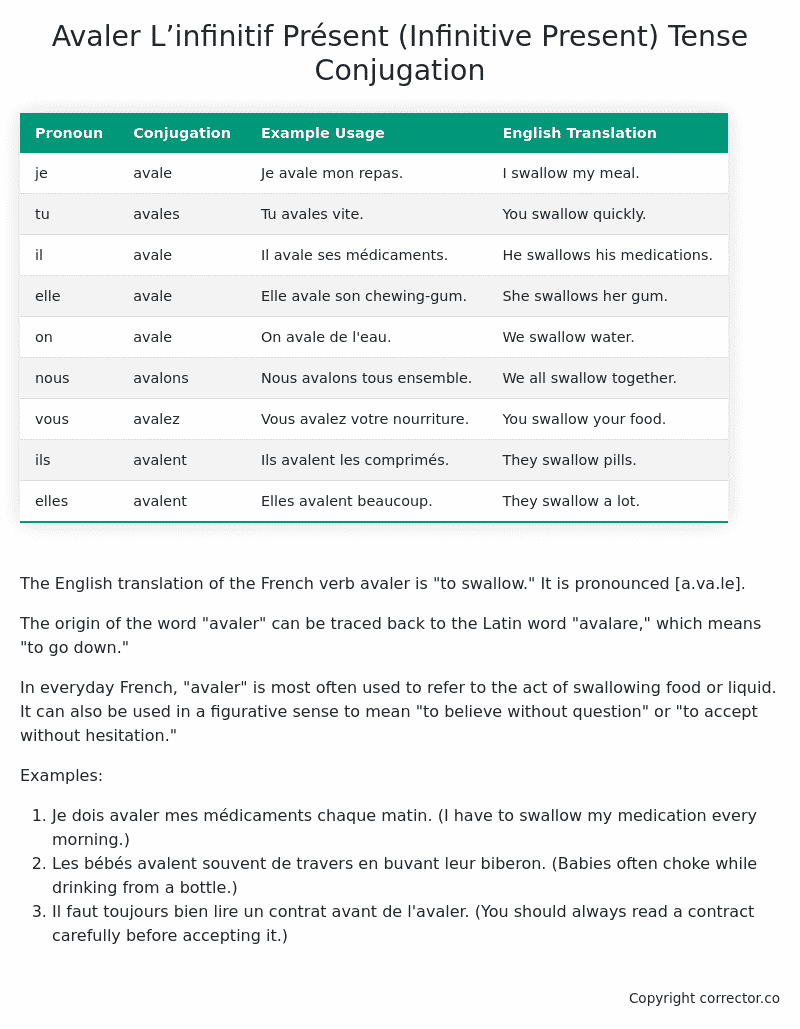L’infinitif Présent (Infinitive Present) Tense Conjugation of the French Verb avaler
Introduction to the verb avaler
The English translation of the French verb avaler is “to swallow.” It is pronounced [a.va.le].
The origin of the word “avaler” can be traced back to the Latin word “avalare,” which means “to go down.”
In everyday French, “avaler” is most often used to refer to the act of swallowing food or liquid. It can also be used in a figurative sense to mean “to believe without question” or “to accept without hesitation.”
Examples:
- Je dois avaler mes médicaments chaque matin. (I have to swallow my medication every morning.)
- Les bébés avalent souvent de travers en buvant leur biberon. (Babies often choke while drinking from a bottle.)
- Il faut toujours bien lire un contrat avant de l’avaler. (You should always read a contract carefully before accepting it.)
Table of the L’infinitif Présent (Infinitive Present) Tense Conjugation of avaler
| Pronoun | Conjugation | Example Usage | English Translation |
|---|---|---|---|
| je | avale | Je avale mon repas. | I swallow my meal. |
| tu | avales | Tu avales vite. | You swallow quickly. |
| il | avale | Il avale ses médicaments. | He swallows his medications. |
| elle | avale | Elle avale son chewing-gum. | She swallows her gum. |
| on | avale | On avale de l’eau. | We swallow water. |
| nous | avalons | Nous avalons tous ensemble. | We all swallow together. |
| vous | avalez | Vous avalez votre nourriture. | You swallow your food. |
| ils | avalent | Ils avalent les comprimés. | They swallow pills. |
| elles | avalent | Elles avalent beaucoup. | They swallow a lot. |
Other Conjugations for Avaler.
Le Present (Present Tense) Conjugation of the French Verb avaler
Imparfait (Imperfect) Tense Conjugation of the French Verb avaler
Passé Simple (Simple Past) Tense Conjugation of the French Verb avaler
Passé Composé (Present Perfect) Tense Conjugation of the French Verb avaler
Futur Simple (Simple Future) Tense Conjugation of the French Verb avaler
Futur Proche (Near Future) Tense Conjugation of the French Verb avaler
Plus-que-parfait (Pluperfect) Tense Conjugation of the French Verb avaler
Passé Antérieur (Past Anterior) Tense Conjugation of the French Verb avaler
Futur Antérieur (Future Anterior) Tense Conjugation of the French Verb avaler
Subjonctif Présent (Subjunctive Present) Tense Conjugation of the French Verb avaler
Subjonctif Passé (Subjunctive Past) Tense Conjugation of the French Verb avaler
Subjonctif Imparfait (Subjunctive Imperfect) Tense Conjugation of the French Verb avaler
Subjonctif Plus-que-parfait (Subjunctive Pluperfect) Tense Conjugation of the French Verb avaler
Conditionnel Présent (Conditional Present) Tense Conjugation of the French Verb avaler
Conditionnel Passé (Conditional Past) Tense Conjugation of the French Verb avaler
L’impératif Présent (Imperative Present) Tense Conjugation of the French Verb avaler
L’infinitif Présent (Infinitive Present) Tense Conjugation of the French Verb avaler (this article)
Struggling with French verbs or the language in general? Why not use our free French Grammar Checker – no registration required!
Get a FREE Download Study Sheet of this Conjugation 🔥
Simply right click the image below, click “save image” and get your free reference for the avaler L’infinitif Présent tense conjugation!

Avaler – About the French L’infinitif Présent (Infinitive Present) Tense
Forming the Infinitive Present
Common Everyday Usage Patterns
As a Verb’s Dictionary Form
After Modal Verbs
As an Imperative
In Infinitive Clauses
Interactions with Other Tenses
Present Tense
Future Tense
Conditional Tense
Passé Composé
Imperfect Tense
Subjunctive and Conditional Moods
Summary
Want More?
I hope you enjoyed this article on the verb avaler. Still in a learning mood? Check out another TOTALLY random French verb conjugation!


